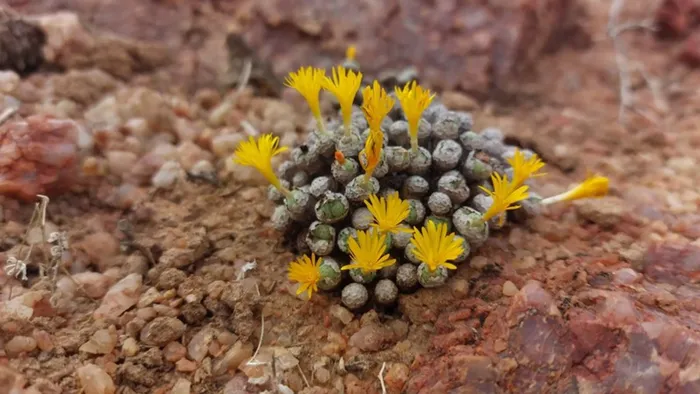Plant poachers get 15 years for smuggling rare Northern Cape succulents

A popular target in the illegal succulent trade are plants from the Conophytum genus, South African and Namibian succulent plants that belong to the family Aizoaceae.
Image: South African National Biodiversity Institute
JUSTICE has caught up with four men who attempted to profit from the poaching of the Northern Cape's rare and endangered plants.
According to Northern Cape police spokesperson Captain Ivan Magerman, the Calvinia Regional Court recently sentenced the group of foreign nationals to 15 years behind bars each after they were caught with more than 300 protected succulents — a lucrative haul with an estimated black market value of R330,000.
The four accused — Mark Daddy, Raphael Mhashu, Simbarashe Charanelura and Elton Ngwanati, aged between 25 and 43 — were arrested near Calvinia in April last year after they were found illegally harvesting endangered plant species from the wild. These slow-growing species, prized in international markets for their rarity, are native to the dry, rugged terrain of the Namaqualand region — and are increasingly under threat from environmental crime.
Their arrest and subsequent conviction mark another victory in the fight to protect the Northern Cape’s unique biodiversity. Environmental law enforcement officers, prosecutors and police investigators worked hand-in-hand to build a solid case against the poachers, leading to the sentencing.
The Namaqualand region, part of the Succulent Karoo biome, is home to some of the world’s most diverse and fragile flora. Poaching syndicates have in recent years targeted this biodiversity hot spot, digging up rare plants to smuggle across borders.
SAPS Namakwa district commissioner Brigadier Schalk Andrews praised the teamwork that led to this successful prosecution and said the sentence sends a strong message to would-be poachers and smugglers: the Northern Cape’s natural heritage is not up for grabs.
This latest bust adds to growing efforts by environmental protection units and conservationists to curb the illegal trade in succulents and other endangered plants, which threatens not just the region’s ecology, but also its long-term tourism and sustainability goals.
The Northern Cape continues to tighten the net around environmental crime — and the courts are beginning to reflect that resolve.
Brigadier Andrews commended investigating officer Constable Danver Matthys and public prosecutor Darryl Bromkamp for their collaboration in ensuring justice was served.
Related Topics: